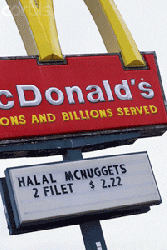DEARBORN — The class action lawsuit that went public last week against McDonald’s corp. and Ford Rd McDonald’s franchisee Finley’s Management Company has drawn a mixed reaction from the community, with rumors and misinformation leading to even more speculation about the facts of the case. The lawsuit stems from Dearborn Heights resident Ahmed Ahmed alleging that he purchased and ate a non-halal McChicken® sandwich that was falsely advertised as halal.
Ahmed, along with the class of people, are named as the plaintiffs in the case, represented by Michael Jaafar, Zakaria Mahdi and Kassem Dakhlallah, three partners of the Dearborn firm Jaafar & Mahdi Law Group, P.C. The parties have agreed to a $700,000 settlement from McDonald’s corp., on behalf of the entire class being represented in the suit. All parties involved agreed that $274,000 of that settlement would be donated to upgrading the HUDA clinic in Detroit, a free medical clinic for families with no health insurance. A second donation of $150,000 towards the Arab American National Museum (AANM) in Dearborn is also part of the agreement.
After the news went public, many residents in the area have expressed their dismay on Facebook, especially on the Dearborn Area Community Members page, where around 4,500 Facebook users discuss local news and events on a daily basis pertaining to the Arab American and Muslim community. Some individuals called for a boycott against McDonald’s, others expressed that the class of people should be entitled to more money from McDonald’s corp. and the Ford Rd. franchisee. Some even questioned why a donation would be made to the AANM when the lawsuit is based on religious dietary practices and not ethnicity.
The Law Offices of Majed Moughni, PLLC posted a public notice on the Facebook page asking residents who are unsatisfied with the current settlement to fill out a document with their name, address and signature by February 15, giving them the option to “intervene” into the Ahmed Ahmed v. Finley’s Management Company & McDonald’s corp. lawsuit, or to “opt out” of that lawsuit for those who are looking to file one of their own. Attorney Majed Moughni plans to object to the settlement agreement at the hearing taking place at the Wayne County Circuit Court on March 1, when the settlement is supposed to be made final. Still, there is no guarantee that the judge will take a different route with the case once hearing the objections.
“Here’s the biggest problem we had with the lawsuit, the people who were buying from McDonald’s are not being compensated. They have a right to object to the settlement and they have a right to tell the court they want the money that they were defrauded from. It belongs to the people who ate from there, and the majority of them are Dearborn-Dearborn Heights residents,” Moughni stated.
Moughni says there might be evidence which suggests that even while the lawsuit was pending in 2012, the McDonald’s location on Ford Rd. continued to sell non-halal chicken products while advertising them as halal.

One Ford Rd. McDonald’s customer who reached out to Moughni is claiming they had an incident at the location in the summer of 2012, when the customer attempted to purchase a halal McChicken® sandwich that led to confusion with the cashier who took the order. The employee appeared to have not been properly trained or educated about halal meat and allegedly gave the customer a sandwich that did not meet their standard. The customer contacted Dearborn Police, who showed up to the location. Two officers assessed that the clerk was a new employee who had made an honest mistake.
Moughni believes some inconsistencies may be showing based on what the clerk had told police officers during this incident.
“They would say all their meat is halal, but that’s not what the employee told the police. They were told they were selling two kinds of meat, but everything they were selling was supposed to be halal. If you can’t train your employees properly, then that presents a big problem,” Moughni added.
Moughni cited another example of when McDonald’s had to settle a lawsuit based on religious laws. In 2002, Hindu religious groups filed a lawsuit against the corporation for misrepresenting their french fries and hash browns to the public as vegetarian, when there was beef flavor in the ingredients. McDonald’s eventually settled the lawsuit by donating $10 million to Hindu groups and other organizations. Moughni believes McDonald’s is entitled to give the community more than just a $700,000 settlement.
Kassem Dakhlallah, one of the attorneys representing the plaintiffs in the current case, says there should be no comparisons between the Hindu case and the current non-halal case, because the circumstances and facts in the two cases vastly differ.
“The Hindu case with McDonald’s was a nationwide lawsuit that involved 15,000 McDonald’s stores regarding allegations that they were responsible for misleading not only Hindus but vegetarians. Our case only involves one store in Dearborn, Michigan. It’s not a case of McDonald’s deceiving every customer 24 hours a day, 7 days a week at all of their locations. There’s been a lot of imagination of what this case could have been. But we know the facts of this case and everything else is just speculation,” Dakhlallah stated.
Daklallah says they’ve worked around the details of the case for 16 months and determined that this settlement would be the best route for the entire class. Additional people who would want to be named as plaintiffs in the case would need to prove that they purchased a meal from the location, and more importantly, would somehow have to prove that their sandwich was not halal when they purchased it. The attorneys believe that would be nearly impossible to prove considering the current case only alleges that the McChicken® sandwich and McNuggets® were only non-halal on some occasions.
“In reality the reason why we chose a class settlement was because of the inherent difficulty that anybody is going to face in proving that any sandwich was non-halal when they purchased it. If we had a class of 100 named plaintiffs that at various times said they bought non-halal food and they could prove it, then the case would have become a lot stronger. If we believe this existed, we would want it to come forward and we would want it to become part of the case, but there is no proof of anything,” Dakhlallah added.
Some confusion that Dakhlallah was able to clear up regarded the misinformation over whether or not the Ford Rd. location sells only halal chicken, or if it carries nonhalal chicken as well. According to their findings, the Ford Rd. location advertises that only their McChicken® and McNuggets® are halal. They do carry other chicken sandwiches that are not halal, including the Premium Crispy Chicken Club® which includes bacon. The McDonald’s Michigan Ave. location in Dearborn, not named as a defendant in the case, also carries halal McChicken® and halal McNuggets®, however they also carry non-halal McChicken® and non-halal McNuggets®. That location differentiates between the two meats by marking their halal items with a sticker.
Dakhlallah says the community should consider the $700,000 settlement as a victory since it’s only based on findings of one location. According to Dakhlallah, McDonald’s corp. was very co-operative with the settlement, and all parties involved agreed to donating money to the HUDA clinic and the Arab American National Museum after long hours of research and assessments. He asks residents to carefully read the details of the class notice that has been distributed to local mosques and published in The Arab American News before jumping to conclusions.
“People should really read the class notice. That provides all the information they need to know regarding the case. If they listen to people who don’t know the facts of this case, they are running the risk of seriously being mislead of what their rights are. We went toe-to-toe with one of the largest corporations in the world, and sixteen months later, after we went to mediation three seperate times in front of the Chief Judge of the Wayne County Circuit Court, we reached this settlement,” Dakhlallah stated.
To read the details of the class action notice regarding the Ahmed Ahmed v. Finley’s Management Company and McDonald’s corp. lawsuit, see pages 4 & 5 of this week’s issue of The Arab American News. The final approval of the settlement, opened to the public, is expected to take place on March 1 at 11 a.m. on the 11th floor of the Wayne County Circuit Court City-County Building located at 2 Woodward Avenue in Detroit.






Leave a Reply